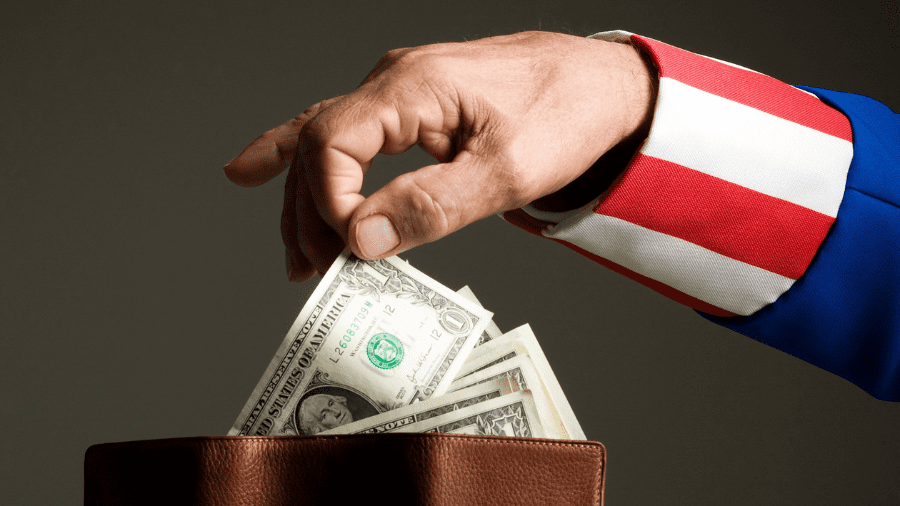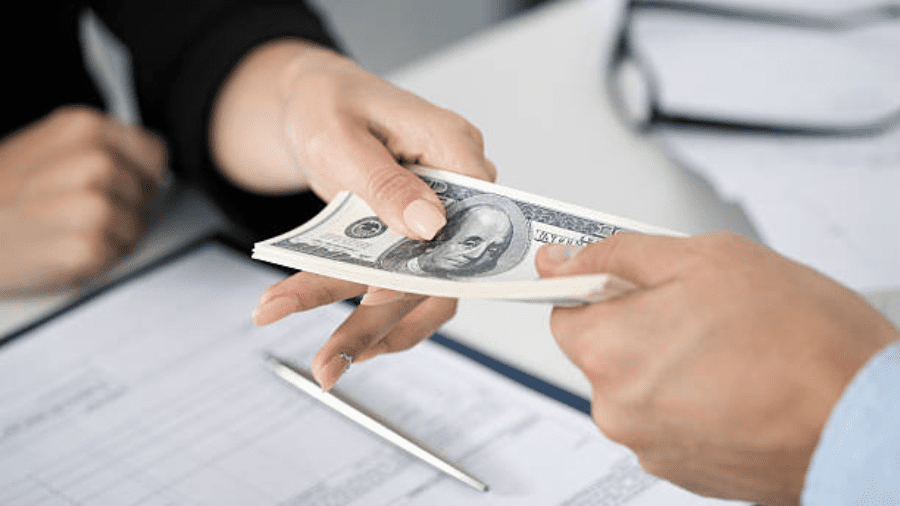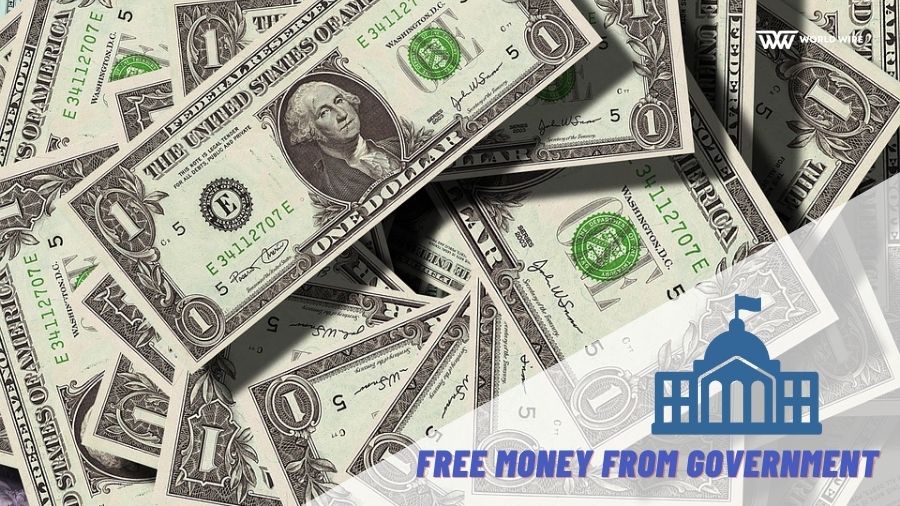Do you know you can get free money from the Government? Well, that’s true.
In this article, we have covered a detailed guide that you can follow to learn about the Government schemes that can help you get free money, how to apply for the program, and much more.
So, without any further ado, let’s get started –
What are Financial Hardship Grants?
As a result of the economy’s precarious state, many people are struggling financially or are out of work. Monthly service fees apply to electricity, gas, and water utilities.
If you and your family are struggling to make ends meet due to job loss, illness, or other hardships, you can receive free money from Government or private foundations.
The Government offers Financial Hardship Grants to low-income households, which can be used for things like debt repayment, medical expenses, or home repairs. Several organizations offer these subsidies, and each has different eligibilities for applicants.
What is a Free Government Grant?
A free government grant is a financial award or contribution provided by the government to individuals, organizations, or businesses to support various projects or initiatives. Unlike a loan, a grant does not need to be repaid, which means it is essentially free money.
Government grants may be provided by federal, state, or local government agencies, and they can be used for a variety of purposes, such as education, scientific research, community development, health care, and more.
However, it’s important to note that government grants are often competitive, and there are usually specific eligibility requirements and application processes that must be followed in order to receive them.
Government grants are usually awarded based on a specific set of criteria, such as the type of project or initiative being proposed, the applicant’s qualifications and experience, the potential impact of the project on the community or society as a whole, and the availability of funds.
Grants may be awarded in the form of cash or other resources, such as free government phones, equipment, land, or services, and these grants may be awarded for a specific period of time, such as one year or multiple years. Some grants may also require the recipient to provide regular progress reports or meet certain milestones in order to continue receiving the funding.
Over 14,000 federal programs are currently operational and working hard to meet these needs through 24,000 state programs. Furthermore, over 30,000 private foundations and 20,000 scholarship programs are working hard to ensure those in need can access government grant money.
Programs That Offer Free Money from the Government

State and federal programs aim to assist low-income individuals and families in recovering and becoming self-sufficient.
Various grant and program options are available for free government money; here, we have mentioned a few –
Childcare Funding
Paying for daycare so you can work and purchase necessities such as milk and baby food are just the beginning of the costs associated with raising a child. Fortunately, most states provide free government money for childcare assistance to families with children under the age of 13.
The Child Care and Development Fund, administered by the US Department of Health and Human Services, funds daycare centers, pediatric care, and healthy eating. You should be aware that eligibility for this program is determined by your household income.
Assistance with Home Repair and Winterization
If you are 62 or older and live in a city, you may be eligible for a $7,500 government grant to repair your home windows or remove hazards such as mold, lead paint, or faulty wiring.
The Weatherization Assistance Program Technical Assistance Center (WAPTAC) is a federally funded resource for homeowners who want to winterize their homes to save money on their energy bills. While families with children or disabled family members are given priority, approximately 30 million homes are reportedly eligible.
Loans are available for 20 years at 1% interest, and grants are government funds that do not need to be repaid. Both are available through the Rural Housing Repair Loans and Grants program, which is only available to rural homeowners.
Grocery money from the government and free food
Three government programs are in place to assist people struggling to make ends meet in getting the food they require to feed their families (at least until they can support themselves).
Food Stamps – Food Stamps, also known as the Supplemental Nutrition Assistance Program (SNAP), is a program that helps financially weaker households. Because eligibility is based on demonstrated financial need, an application and supporting documentation will be required.
Those who qualify for SNAP receive monthly benefits through Electronic Benefit Transfer cards, which function similarly to debit cards and can be used to purchase food at grocery stores. You can use the EBT card to buy Vitamins & Pedialyte with Food Stamps.
Women, Infants, and Children (WIC) – Low-Income Families Special Supplemental Nutrition Program. This free federal money program is only available to low-income women who are expecting a child, breastfeeding, or caring for a child under the age of five. Money is included for necessities such as food and medicine.
At School Lunch (for those under 18) – School-aged children receive free or low-cost lunches every day. A child must be living in a household receiving benefits from another federal program, such as SNAP (the Supplemental Nutrition Assistance Program), or the child must be homeless, migrant, runaway, or foster child to be eligible.
Government Grants for Utility Bills
The Low Income Home Energy Assistance Program has been a lifeline for families who would otherwise be unable to afford basic comforts like heating and cooling for many years. This Health and Human Services grant’s eligibility and minimum income requirements may differ by state.
If you are eligible for the program, you can get free money from the government to pay utility bills.
Complimentary Phone Service
If you need a phone plan but cannot afford one, apply for the Lifeline or Affordable Connectivity programs.
Individuals with low incomes who qualify for the program are provided the means to communicate with loved ones, local emergency services, and potential employers. Of course, some prerequisites must be met (mostly income-based).
Housing Choice Voucher
HCV is a government-backed homeownership program that may assist low-income families in purchasing homes on the private market.
To apply, interested parties should contact their respective local Public Housing Agencies (PHAs), which manage the program with HUD funds (HUD).
In contrast, the Homeownership Preservation Foundation’s HOPE program can help those having difficulty keeping up with their mortgage payments and are at risk of losing their home to foreclosure.
College Education at No Cost
One of the best ways to get free money from the government is to apply for a government grant to help pay for college.
Although some students are fortunate enough to receive scholarships to help cover the cost of higher education, most college graduates graduate with significant debt that they will be paying off for decades.
Financial need, enrollment status, and total tuition fees are just a few factors that determine an individual student’s federal Pell Grant award, which can provide up to $6,000 per year. The student is usually responsible for covering some or all of the costs.
Government Funding for Healthcare
Uninsured people can enroll in a health insurance plan through the Health Insurance Marketplace. Premium tax credits are available to those who earn less than a certain amount, effectively making health insurance free.
You can also determine your Medicaid eligibility. It is critical to thoroughly research the eligibility rules, as they differ from state to state.
For uninsured children and pregnant women whose families earn too much to qualify for Medicaid but not enough to afford private coverage, the Children’s Health Insurance Program (CHIP) may be an option. Eligibility requirements, like Medicaid eligibility requirements, vary by state.
Furthermore, InsureKidsNow.gov is an excellent online resource for learning about health insurance options for children and their families.
Unemployment Assistance from the Government
If you have recently lost your job and are having difficulty meeting your financial obligations or purchasing food, you can apply for unemployment assistance from the Department of Labor.
The assistance may be all you need until you can find new employment. However, not everyone is qualified, so conduct preliminary research.
The government provides financial assistance to seniors and veterans
If you are a veteran in need of medical assistance, the United States Department of Veterans Affairs can assist you in qualifying for a grant to cover those costs.
The National Council on Aging’s BenefitsCheckUp tool has made it easier for our country’s seniors to find over 2,500 federal and state benefits (as well as some from private companies). This portal provides access to senior benefits such as free or low-cost meals, medical care, prescription drugs, and more.

Energy Cost Reduction Program for Low-Income Families (LIHEAP)
Low-income homeowners can receive government assistance through the US Department of Health and Human Services Low Income Home Energy Assistance Program (LIHEAP).
If your family is low-income and you have difficulty affording the high cost of heating and cooling your home, this program can assist you.
The eligibility requirements for each state’s Low Income Home Energy Assistance Program can be found online.
Seniors’ Tax Advice Service
Hiring a tax professional is an unnecessary expense for many seniors. The IRS’s Tax Counseling for the Elderly (TCE) program is intended to make it easier for people over the age of 60 to file their taxes. If you need financial assistance, the program offers free advice on retirement plans, pensions, and taxes.
Grant Program to Assist in the Repair of Rural Homes
The government established the Rural Home Repair Loan and Grant Program to assist with the costs of maintaining and repairing homes in rural areas.
Loans and grants of up to $7,500 are available, with a 20-year repayment period at 1% interest. Lead paint and deteriorating buildings are just two of the dangers this government-funded program can help to address.
Small Business Administration
A Small Business Administration loan can provide the capital needed to start a new business. This type of credit is made available by tens of thousands of economic development centers across the United States. This loan is preferable to a traditional bank loan due to its exceptionally low interest rates.
FHA Down Payment Assistance
The Federal Housing Administration (FHA) Down Payment Grant is a government program that can assist you in making a down payment on a home.
States that assist with closing costs and down payments include those that offer up to 5% of the loan amount. HUD, the Housing and Urban Development Department of the United States Federal Government, is in charge of this aid initiative.
Additional Federal Student Aid Grants (FSEOG)
Students with exceptional financial needs are eligible for the Federal Supplemental Educational Opportunities Grant (FSEOG). This award is intended to supplement other sources of funding.
Grants from the government range from $100 to $4,000. Keep in mind that the amount of money you receive is determined by your level of need.
How to Apply For Free Government Money

If your family struggles financially, you may be eligible for free money from the government or Financial Hardship Grants. However, you must demonstrate that you truly require the funds.
Here is how you can apply for free money from the government –
- Visit Grant.gov, the official government grants website. There are over a thousand different types of Financial Hardship Grants available.
- Learn about the different types of free money from Government grants, Financial Hardship Grants and how to apply for them.
- Make it clear whether you’re signing up as an individual or a business.
- Select Grants to see the entire graph. It details who is eligible to apply, how much time you have to do so, and how many grants are available.
- You can download the application after deciding which grant is best for you.
- Please fill out the form fields and email them.
You’ll receive an email informing you of the status of your application, whether you’ve been approved, and when you can expect to receive your grant funds.
Ways to Get Financial Help From the Government

Significant COVID relief was issued in 2020 and 2021, giving new meaning to the phrase “free money from the government.” Even though most pandemic aid has ended for the time being, day-to-day government programs are still available to those in need.
Here are the six ways you can get free money or financial help from the government –
Get help paying for necessities like food and utilities
If you require financial assistance with your utility or phone bill, programs like Lifeline or The Low Income Home Energy Assistance Program may be able to help.
The Health and Human Services Department funds the states, distributing the funds to grant recipients. Each state determines the minimum and maximum allowable income levels for eligibility, and If you are eligible for the Lifeline program, you may be able to save money on your phone or internet bill.
Obtain childcare funding
For many families, the cost of child care can be prohibitively expensive. According to the Economic Policy Institute, a non-profit organization dedicated to improving the lives of low- and middle-income workers, the annual cost of infant care ranges from nearly $5,000 in Mississippi to more than $22,600 in Washington, D.C.
If a family is having financial difficulties, the Child Care and Development Fund may be able to assist. The federal government’s Health and Human Services Administration manages the fund that provides childcare assistance grants to states, territories, and Native American tribes. These income-based grants typically cover childcare costs for children under the age of 13.
Recover any lost funds
Unclaimed funds are not “free” but rather “owed” to you. There is money out there that has been forgotten for a long time, whether it’s a utility deposit, a savings bond, life insurance benefits, or an uncashed paycheck.
Companies sometimes turn over unclaimed funds to the state due to clerical errors or outdated contact information. To see if you are eligible for unclaimed funds, go to unclaimed.org, maintained by the National Association of State Treasurers. Over $2.8 billion had been returned to their rightful owners as of the end of the 2020 fiscal year, with an average claim payment of around $1,600.
Obtain Assistance with a mortgage down payment
You’re determined to buy a home but need more cash for a down payment. Submit an application to your state for a down payment. These grants and loans can be used to pay for things like a down payment and closing costs on the house, and some Assistance is not limited to low-income borrowers.
Homebuyers in Nevada, for example, can pay a fee and receive a grant of up to 5% of the loan value for a down payment and closing costs.
Investigate health insurance tax credits
People who purchase health insurance through the federal government’s marketplace may be eligible for a tax credit. The premium tax credit sent directly to the insurance company can reduce your insurance premiums.
Seek Financial Assistance for education
When covering the high cost of higher education, government college grants, such as the federal Pell Grant, can be a big help. Any award’s exact amount is determined by need, tuition, and enrollment status. Students must file a FAFSA to be considered for a Pell Grant.
Many scholarship and grant programs at the institutional and state levels also require an application.
Government Hardship Grants For Single Mothers
Many single mothers face the challenge of managing the family’s finances on their own. They need to cover household expenses in addition to paying for daycare or a nanny to watch the children while they are at work.
In the United States, approximately 900 government programs are aimed at assisting single mothers. If a single mother is a sole breadwinner in her family, she may be eligible for various government assistance programs like –
- Childcare Funding
- Food stamps
- Women, Infants, and Children (WIC)
These programs have already been described in the previous section; you can read them there.
Other than these, most cities and counties have a human or social services department where you can apply for programs such as Medicaid, SNAP (food stamps), and TANF (Temporary Assistance for Needy Families).
Don’t hesitate to get in touch with your local human or social services office for more information on available programs, eligibility requirements, and application procedures.
Free Government Money For Purchasing a Home

Buying a home can be stressful. However, you can look into federal funding options.
The government’s goal in creating these programs is to help those who cannot afford to buy a home on their own. Homebuyers can put down as little as 3% of the purchase price through this program, and after working with housing counseling services, their down payment can be as low as $0.
The Federal Housing Administration (FHA) is always available to assist those struggling to obtain the funds for a mortgage down payment, and The US Department of Housing and Urban Development has also stepped in to help the people.
They can help you if you need help buying a home but don’t have the funds to do so on your own.
Government Hardship Grants For Elderly Seniors
Grants for Senior Citizens is a federally funded program that provides financial assistance to the elderly.
It also allows women and men between the ages of 54 and 59, three years before traditional retirement age, to receive the third-age subsidy provided by various federal government programs.
This program was designed to provide improved living standards for the elderly through increased social security. They can be direct or indirect financial assistance.
Government Hardship Business Grants
The US government has long believed that entrepreneurial activity is critical to the country’s economic health. Opening a new business creates not only more jobs but also more tax revenue for the government. Grants are available to businesses through low-interest financing, startup expansion programs, skill-improvement training, and free counseling.
Federal and state government grants are also available to assist small businesses, startups, and expanding businesses. Obtaining one of the numerous available government business subsidies is an excellent first step for anyone with a business or a business idea.
Government Hardship Grants For Housing, Food, Mortgage, And Rent
The government offers a variety of assistance programs and subsidies to low-income people, including those who are homeless, hungry, or unable to make mortgage or rent payments. The federal government, state governments, local charities, churches, and community organizations work together to solve housing problems by providing emergency housing and rent subsidies.
The Emergency Food and Shelter Program assists low-income and needy families with housing, household goods, and other necessities. Your rent/mortgage, security deposit, food, and moving expenses will all be covered by the EFSP.
FAQs
Can I get free money from the government?
Yes, you can get free money from the government if your household income is low and you are eligible for the program.
Do I have to pay back the grants?
You don’t have to pay back the grant money that the federal government, non-profits, state governments, and other groups give you.
Can you ask people for money on the internet?
Crowdfunding is one way people and groups can ask for money from a large group.
Can you make money online without paying for anything?
Yes, you can make money online without spending any money. One of the best ways to make money online is to do freelance work. You can work online as a freelancer and make a good living.







Add Comment